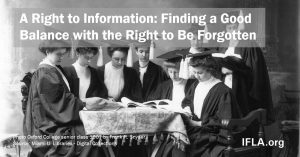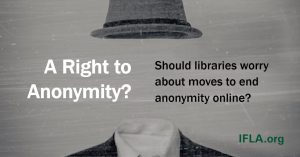Over the last few months, FAIFE marked the 20th anniversary of the IFLA Statement on Intellectual Freedom with a series of blogs outlining the debates on intellectual freedom in different countries. Today, Ahmet A. Sabancı – a freelance writer, journalist and social critic who focuses on issues surrounding freedom of expression, journalism and the internet – shares an essay about the threats to freedom of information that exist in Turkey.
The essay is based on a presentation he gave during the 2019 World Library and Information Congress session “20 Years of the IFLA Intellectual Freedom Statement: Constancy and Change”. You can find a recording of the session on the website of WLIC 2019.
The Many Faces of the Freedom of Information Threats in Turkey
Ahmet A. Sabancı – [email protected]
In recent years, the state of freedom of information in Turkey has become a well known and discussed topic all around the world. Government censorship and control over media becoming more ruthless every passing day, the situation in Turkey has become an example for many. Especially with the rise of similar developments in different parts of the world, understanding how it works in the countries where the situation is already a concern becomes more important.
To understand and analyze the current freedom of information situation in Turkey, I propose a three-layer explanation of the threats against this freedom. These three layers will both help us to understand the levels of the threats and how one type of threat intensifies another.
- Government Censorship and Control
Internet Censorship
Law 5651, the infamous law that regulates the Internet in Turkey, has been used actively to censor the Internet in Turkey. With the latest update in 2014, this law gives the government an unlimited power to censor the Internet and surveil Turkish internet users.
According to latest research, there are 245,825 websites blocked in Turkey. This number has increased even since. Some of the well-known websites blocked are Wikipedia; Imgur, an image sharing platform; Pastebin, a text file sharing platform for coders; and Tor Project, a tool for people to use the Internet anonymously. As well, many VPN services have been blocked in Turkey in recent years. This leaves many people without safe options to circumvent the censorship.
The list of censored websites also includes many political websites and news platforms. The most famous one is sendika.org, which is a labor-focused left-wing news site. The courts have ordered access to this site be blocked 63 times: the owners are now using the domain sendika63.org. There are many political news sites or alternative media projects that experience similar situations.
The Turkish government also sends take-down requests to platforms such as Twitter and Facebook. Turkey is usually at the top of their quarterly take down request lists. For example, Turkey sent 5014 removal requests, specifying 9155 accounts between July-December 2018. This puts Turkey on top of the list of countries that ask for content removal. In the same period, Russia comes after Turkey with 3344 requests for 3391 accounts. For comparison, during the same time period Germany sent only 42 requests with 44 accounts specified, and Canada sent 6 requests with 9 accounts specified.
There is also a new regulation that gives the governmental body that regulates television and radio new powers over Internet-based dissemination platforms such as Netflix and YouTube. Currently, Turkish television is heavily controlled and censored, and subjecting these platforms to similar controls might cause most of them to leave the country.
Censorship of Books and Journalism
The Turkish government uses Presidential decrees for censorship. Since the 2016 coup attempt, more than 30 book publishers and 100 news outlets have been shut down and all of their books have been collected. This has resulted in the removal of more than 135,000 books from Turkish libraries.
Journalism is also under heavy pressure in Turkey. Any journalist who writes news articles critical of the government risks arrest and imprisonment. The most-used excuses for the suppression of journalism are alleged links to terrorism or the revealing of government secrets. Right now, Turkey is the number-one jailer of journalists in the entire world. There are in addition ongoing incidents of violence against journalists, which usually comes from random groups because of what journalists have said or written.
- Media Ownership and Economic Control
One of the most important threats in Turkey to freedom of information is the concentration of media ownership. Most of the mainstream media, including book publishers and distributors, are owned by a small group of conglomerates which have close ties with the government. The current media ownership situation and its effects in Turkey can be read about in detail on the Media Ownership Monitor Turkey website.
This ownership relationship results in censorship, limiting readers’ access to only information produced by politically approved groups. This forces many minority or opposition groups to search for alternative means of disseminating information. It seriously limits their reach to the general public. The other current censorship mechanisms sit atop this limitation.
Already controlling mainstream media and information distribution through ownership, the government also uses other means of economic pressure over the opposition media, such as reducing advertising revenue. Many corporations buy advertising only from media organizations that are unofficially “approved.” The government also uses official announcements and press releases, distributed through Basın İlan Kurumu, which is an important revenue for print media, only to newspapers that are politically close to the government.
- Self-Censorship and Other Pressures on Intellectual Workers
These two layers of control have created an atmosphere in Turkey that results in self-censorship and an avoidance of “dangerous topics,” a widespread phenomenon. Self-censorship occurs in many ways. This can be publishers avoiding some content, libraries or bookstores not distributing books about “dangerous topics” or people afraid of talking about such issues. One of the main reasons for this situation is the legal pressure, mentioned as the first layer of censorship in this blogpost.
There is also the social pressure side of this, which can easily be manifested as people “doxing” (unauthorized online disseminating of identifying or personal information about someone) writers and journalists or reporting them to the police because of their work; or reporting teachers because of the books that they have recommended. This kind of pressure also forces many people to self-censor.
This social pressure is perceived by everyone. Whether they’re sharing something on a social media platform or talking with a group of friends, people feel the need to self-censor. This pressure even blocks the spread of information between small groups of people.
Can Libraries Help?
Unfortunately, the current situation of libraries is not good in Turkey either. Limited library budgets and shortage of library personnel leaves many libraries in a bad shape. There is also a serious lack of libraries in general across Turkey. In addition to these economic pressures, there is political pressure that affects librarians, inasmuch as a librarian might be demoted because of their support for an opposition candidate. Filling librarian positions with unqualified workers also weakens libraries.
Although the current situation seems bleak, librarians can help the public to fight back against the threats to the freedom of information. Promoting libraries and hosting events to help people to learn how to find more diverse information sources or how to navigate online when there are many untrusted sources can be an important mission for libraries. In these conditions finding, fact-checking and organizing information is vital for every person. Librarians can help people to learn how to do it.
In Conclusion
Freedom of information and intellectual freedoms in general are in a dire condition in Turkey. This is caused by different actors using diverse tools and tactics to restrict the information that the public can access. A fight against these pressures on the legal front continues, but its effects are unfortunately limited.
Because of this pressure, many people prefer to use the Internet for accessing information, but the Turkish people face new problems on that front. Internet censorship, blocking of access to privacy and anonymity tools and many people lacking Internet literacy leave people in a disadvantageous situation.
It is hard to say how and when this situation in Turkey is going to change, especially because we are seeing similar trends gaining traction elsewhere the world. Many people in Turkey just accept the situation and adjust their lives to it, instead of fighting back. Because we are living in a time in which we must struggle to defend the freedom to access information (and even information itself), the work of organizations such as IFLA becomes much more important and vital. Without our intellectual freedoms, we put everything we humans have created in danger.
Ahmet A. Sabancı is a freelance writer and journalist and a social critic who focuses on issues around internet, freedom of expression and information and technology. He’s also working to improve the situation of journalism in Turkey in the platform called NewsLabTurkey, of which he’s one of the co-founders and its Newsletter Editor.
 Two much anticipated rulings have come from the Court of Justice of the European Union. Both are ‘preliminary rulings’, effectively requests to the Court to offer clarification on what EU law – in this case the ‘right to be forgotten’ doctrine created by the Court in 2014 and placed in legislation in the
Two much anticipated rulings have come from the Court of Justice of the European Union. Both are ‘preliminary rulings’, effectively requests to the Court to offer clarification on what EU law – in this case the ‘right to be forgotten’ doctrine created by the Court in 2014 and placed in legislation in the  With
With